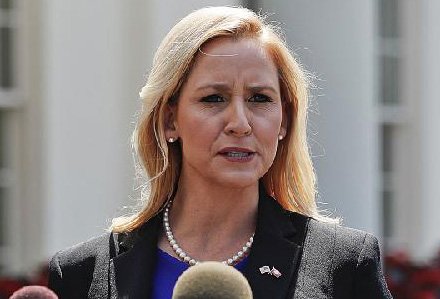Arkansas Attorney General Leslie Rutledge, who is being sued over some of her decision-making practices, sidestepped Pulaski County Circuit Judge Wendell Griffen's order requiring her to submit to questioning under oath Friday by transferring the lawsuit to federal court and out of his jurisdiction.
The lawyers suing the first-term Republican over the way she reviews ballot initiatives responded by moving to immediately drop the case, stating that they'd rather refile the lawsuit in state court than take the time to challenge Rutledge's decision to switch jurisdictions.
Attorneys Nate Steel and Alex Gray stated in court filings that they were entitled by court rules to immediately withdraw the litigation from federal court.
They are hoping to meet a June 6 deadline to get proposals for legalizing casino gambling and changing the state's sovereign immunity doctrine on the November ballot.
But when U.S. District Judge Kristine Baker declined to act immediately, giving Rutledge four days to respond to their withdrawal request, the lawyers dropped the request.
Instead, Gray and Steel asked Baker to do what they'd petitioned Griffen to do -- convene a hearing to order Rutledge to certify the gambling and sovereign immunity proposals so they could begin the process of getting them on the November ballot.
"In order to expedite this matter in all respects, [plaintiffs] welcome the opportunity to present their case in this court," their motion states. "[We] request an emergency hearing ... for temporary restraining order and preliminary injunction."
Litigation transfers from state to federal court are a fairly routine procedure, but Gray told news reporters that Rutledge's venue change was really a delaying tactic. She moved the lawsuit into federal court about 90 minutes before she was scheduled to appear before Griffen for questioning.
Gray and Steel are representing interest groups advocating proposed amendments to the state constitution that would separately legalize casino gambling and change the state's sovereign immunity doctrine.
They have accused Rutledge of abusing her authority by deliberating keeping those proposals away from voters.
If the lawyers can get the judge to order their proposals be certified, they will have until June 6 to begin the process to get the proposals on the November ballot, which includes collecting the signatures from 84,859 voters by July 6.
Rutledge has rejected every ballot proposal submitted to her office over the past 18 months -- at least 65 -- saying none of them have met the standards required by the state law that gives the attorney general review authority over ballot initiatives. She said two Arkansas Supreme Court decisions in 2016 tightened those review standards even further.
Rutledge said this week that the General Assembly needs to improve the ballot initiative process when it meets next year, but did not say what changes she favors.
The plaintiffs -- the Committee to Restore Arkansans' Rights, promoting sovereign immunity changes, and Driving Arkansas Forward, advocating for gambling -- are also suing to overturn the attorney general's review authority, arguing that the statute conflicts with the Arkansas Constitution.
The constitution gives citizens the right to change state law at the ballot box, but that process can only begin after the attorney general approves the language of any proposed ballot initiative.
Griffen's order stated that he was only compelling Rutledge to submit to questioning in court because she had resisted cooperating with the lawyers during the pretrial evidentiary exchange known as as discovery.
The five-page decision, released Monday, indicated that while Griffen would allow the lawyers to question Rutledge, he might not require her to answer them. The judge wrote that he would have to hear what was asked of her before he could decide whether she would have to respond.
Rutledge opposed any questioning. State lawyers argued that she could not be forced to answer questions about how she reached her conclusions about specific ballot proposals.
Friday's court maneuvering was the second time in less than a year that Rutledge has turned to another court to circumvent a Pulaski County circuit judge's order compelling her to personally act.
Last year, Rutledge fought orders by Judge Tim Fox that she participate in efforts to figure out how Arkansas' birth-certificate law should be modified so it would both satisfy constitutional standards set by the U.S. Supreme Court and comport with strictures imposed by the Arkansas Supreme Court on how the law could be changed.
Warning that the law needed to be brought up to the federal court's standard as soon as possible, Fox gave Rutledge and her staff 54 days to work with the lawyer who had challenged the legality of the birth-certificate law to try to reach a solution.
Citing her busy schedule, Rutledge first asked to be allowed to send a deputy empowered to act on her behalf, an offer that Fox declined, although he did agree to excuse her from part of the process.
Fox stated that the unusual circumstances meant that Rutledge's personal participation was "critical" to achieving a solution that would satisfy both of the high courts.
The judge warned that if such a solution could not be reached, the only avenue left for him to satisfy the demands of both high courts would be for him to bar the state from continuing to issue birth certificates until the Legislature could craft new laws.
Rutledge chose to appeal his order to the state Supreme Court two days before the deadline.
Asking the justices to intervene and block his order, Rutledge argued that Fox had exceeded his authority by attempting to compel her to participate in the mediation and that he had refused to recognize the solution that had been reached.
On that deadline date, Fox ordered the state to stop issuing birth certificates, an injunction that lasted a few hours until Gov. Asa Hutchinson used his executive powers to make the changes necessary for the laws to satisfy the federal Supreme Court ruling.
A Section on 05/19/2018

